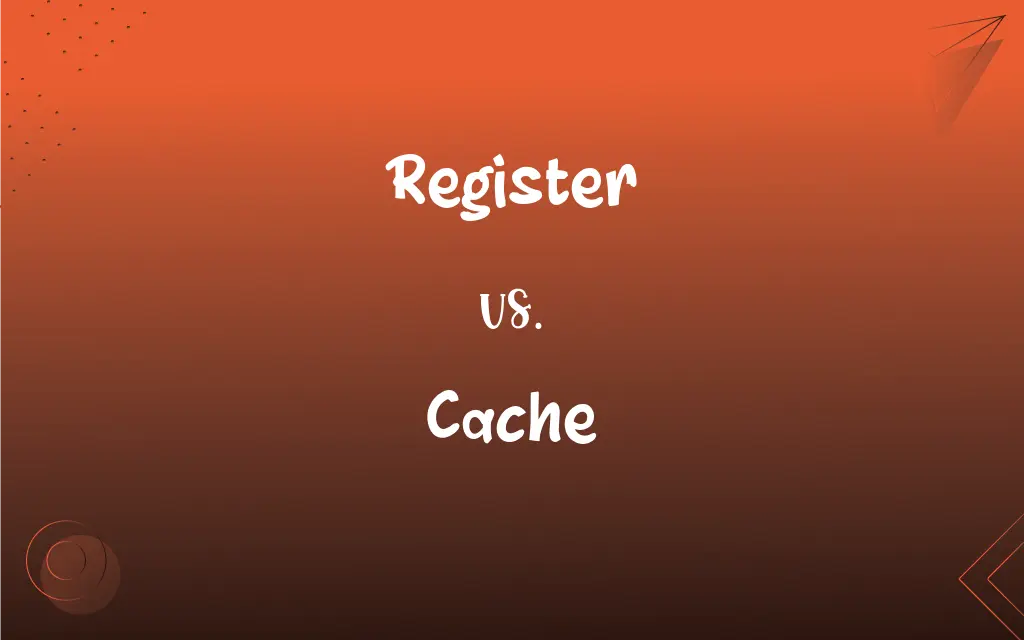Register vs. Cache: What's the Difference?
Edited by Aimie Carlson || By Janet White || Published on February 4, 2024
Registers are small, ultra-fast storage locations in a CPU for immediate data processing, whereas cache is a larger, slightly slower memory component that stores frequently used data for quick access.

Key Differences
Registers in a CPU are the smallest and fastest form of memory, used to store data that is immediately and currently being processed. Cache memory, while also fast, is larger than a register and is used to store data that the processor might need soon, reducing the time to access data from the main memory.
Registers directly interact with the CPU, operating at the speed of the processor and are crucial for its operations. Cache memory, being a level removed, serves as a bridge between the ultra-fast registers and the slower main memory (RAM), enhancing overall processing efficiency.
The size of registers is typically measured in bytes, and they are limited in number within a CPU, designed for specific operations. Cache memory is larger, measured in megabytes (MB), and is structured in multiple levels (L1, L2, L3), each varying in size and speed.
Registers are used in the execution of every single instruction by a CPU, requiring rapid access and modification. Cache memory stores copies of data from frequently accessed main memory locations to reduce latency in data retrieval.
Due to their critical role in immediate data processing, registers are integral to the CPU’s architecture. Cache, while essential for performance, is more about managing data flow between the processor and the slower RAM, improving overall system speed.
ADVERTISEMENT
Comparison Chart
Function
Stores data for immediate processing by the CPU
Stores frequently used data for quick access
Speed
Ultra-fast, operates at CPU speed
Fast, but slower than registers
Size
Very small, measured in bytes
Larger, measured in megabytes
Location
Inside the CPU
Between CPU and main memory
Role in Processing
Direct involvement in instruction execution
Reduces data access time from main memory
ADVERTISEMENT
Register and Cache Definitions
Register
Registers hold data that is immediately used by the CPU.
Data in the register is essential for the CPU's current operation.
Cache
The size of the cache can impact overall computer performance.
A larger cache size means more data can be accessed rapidly.
Register
Registers operate at the speed of the processor.
Registers ensure swift execution of computational tasks.
Cache
There are multiple levels of cache memory, like L1, L2, and L3.
The L1 cache is the smallest but fastest level.
Register
Each register serves a specific purpose in the CPU.
The accumulator register is used for arithmetic operations.
Cache
A cache is a memory space that stores frequently accessed data.
The CPU cache retrieves data quickly, improving performance.
Register
A register is a small, fast storage location within the CPU.
The CPU register quickly processes the current instruction.
Cache
Cache memory acts as a buffer between the CPU and main memory.
Data in the cache is accessed faster than in RAM.
Register
The number of registers varies by CPU design.
This CPU's architecture includes multiple specialized registers.
Cache
Cache memory helps reduce the time to retrieve data.
Thanks to the cache, the system doesn't always have to access slower RAM.
Register
A formal or official recording of items, names, or actions.
Cache
An amount of goods or valuables, especially when kept in a concealed or hard-to-reach place
Maintained a cache of food in case of emergencies.
FAQs
How fast are CPU registers?
Registers operate at the speed of the CPU, making them ultra-fast.
What is a register in a CPU?
A register is a small, fast storage location within a CPU for immediate data processing.
Can data in registers be modified?
Yes, data in registers is frequently accessed and modified.
Are registers part of the CPU architecture?
Yes, registers are integral to the CPU’s design and operations.
What is the purpose of cache memory?
Cache memory stores frequently used data to speed up access times.
Is cache memory faster than RAM?
Yes, cache memory is faster than RAM but slower than registers.
How many registers does a CPU have?
The number varies, but CPUs typically have a limited number of registers.
What are the levels of cache in a CPU?
Common levels include L1, L2, and L3, each differing in size and speed.
Can the size of cache memory be upgraded?
No, cache memory size is fixed and determined by the CPU's design.
Do registers have a role in program execution?
Yes, they're essential for the execution of every instruction by a CPU.
What types of data are stored in the cache?
Frequently accessed data and instructions are stored for quick access.
How does cache improve computer performance?
By reducing the time needed to access data from the main memory.
What happens when the cache is full?
Older or less frequently used data is replaced with new data.
Do all CPUs have the same number of registers?
No, the number and type of registers vary between different CPU architectures.
What's stored in CPU registers?
CPU instructions, data for current operations, and other control information.
Does a larger cache always mean better performance?
Generally, yes, but it also depends on the CPU architecture and workload.
Is cache memory volatile?
Yes, like RAM, cache memory is volatile and loses its data when power is off.
Are registers visible to the operating system?
Registers are mostly managed internally by the CPU and not directly accessible by the OS.
Is L1 cache the fastest?
Yes, L1 cache is typically the fastest among the cache levels.
How do registers affect computing speed?
They enable immediate processing of data, essential for fast computing.
About Author
Written by
Janet WhiteJanet White has been an esteemed writer and blogger for Difference Wiki. Holding a Master's degree in Science and Medical Journalism from the prestigious Boston University, she has consistently demonstrated her expertise and passion for her field. When she's not immersed in her work, Janet relishes her time exercising, delving into a good book, and cherishing moments with friends and family.
Edited by
Aimie CarlsonAimie Carlson, holding a master's degree in English literature, is a fervent English language enthusiast. She lends her writing talents to Difference Wiki, a prominent website that specializes in comparisons, offering readers insightful analyses that both captivate and inform.































































